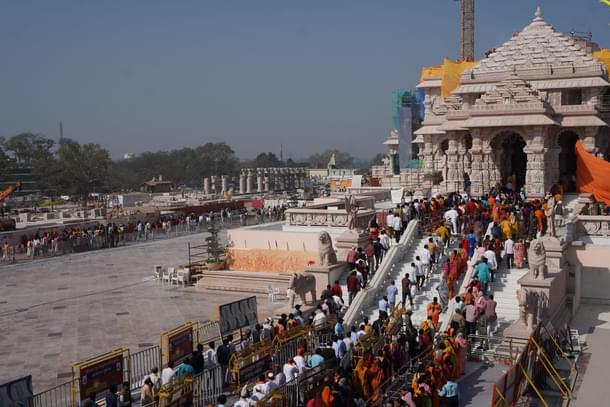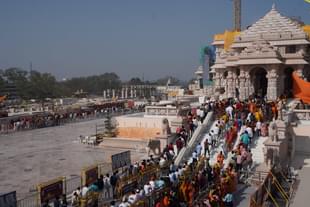News Brief
Tirupati Laddu Controversy: From Ayodhya To Mathura, Temples In Uttar Pradesh Push For 'In-House' Prasad
Kuldeep Negi
Sep 27, 2024, 03:53 PM | Updated 03:53 PM IST
Save & read from anywhere!
Bookmark stories for easy access on any device or the Swarajya app.


Amid the ongoing controversy over the allleged adulteration of Tirupati Temple laddus, demands have been growing in religious centres in Uttar Pradesh, including Ayodhya, Prayagraj, and Mathura for reforms in how 'prasad' is prepared and distributed.
In Ayodhya, Ram Janmabhoomi Temple's chief priest, Satyendra Das, called for a "complete ban" on prasad prepared by external agencies.
Das raised concerns about the purity of ghee used in temple offerings, and urged that "all prasad should be prepared under the supervision of temple priests", PTI reported.
He said that the ongoing controversy regarding alleged use of fat in Tirupati Balaji’s prasad is becoming a national matter.
Das emphasised the need for stringent inspections of the quality of oil and ghee sold nationwide.
Das further claimed that there might be an international conspiracy to desecrate temples by contaminating the offerings with inappropriate substances.
In Mathura, the Dharma Raksha Sangh declared its decision to go back to traditional 'prasadam' recipes, replacing commercially produced sweets with offerings made from natural items such as fruits and flowers.
Saurabh Gaur, the national president of the Dharma Raksha Sangh, underlined the importance of reforms in the prasadam system, saying, "A consensus had been reached among religious leaders and organisations to return to traditional practices of offering and accepting pure, Satvik Prasadam."
In Prayagraj, also known as 'Sangam city', several temples, such as Alop Shankari Devi, Bade Hanuman, and Mankameshwar, have prohibited devotees from offering sweets and processed items.
Shiv Murat Mishra, the head priest of Lalita Devi Temple, said that temple authorities have requested devotees to bring only coconuts, fruits, and dry fruits.
"Until the purity of the sweets is clear in the investigation, they will not be allowed to be offered in the temple," said Mahant Shridharanand Brahmachari Ji Maharaj of the Mankameshwar Temple.
Yamuna Puri Maharaj, the chief patron of the Alop Shankari Devi Temple and secretary of Shri Panchayati Akhara Mahanirvani, said that devotees will not be allowed to bring sweets and prasad from outside.
Mahant Balbir Giri Ji Maharaj, the patron of the Bade Hanuman Temple and leader of Shrimath Baghambari Gaddi, stated that once the temple's corridor is completed, the temple management will take over the production of 'laddu-peda' prasad for the Bade Hanuman Temple.
Also Read: ABHED Bulletproof Jackets: India’s Next-Gen Defence Gear Developed By DRDO And IIT Delhi
Kuldeep is Senior Editor (Newsroom) at Swarajya. He tweets at @kaydnegi.





